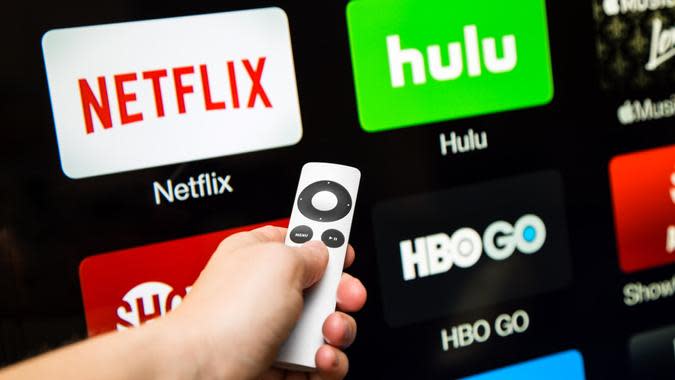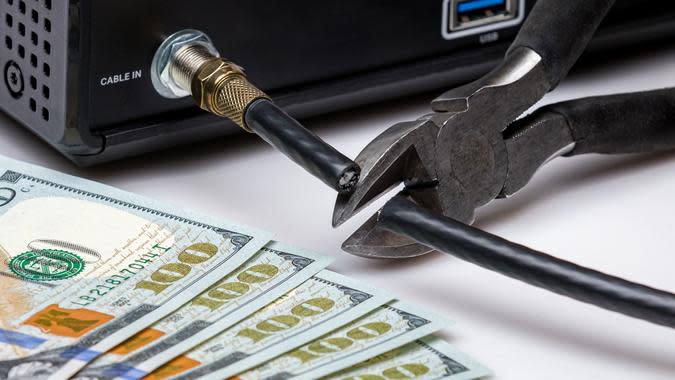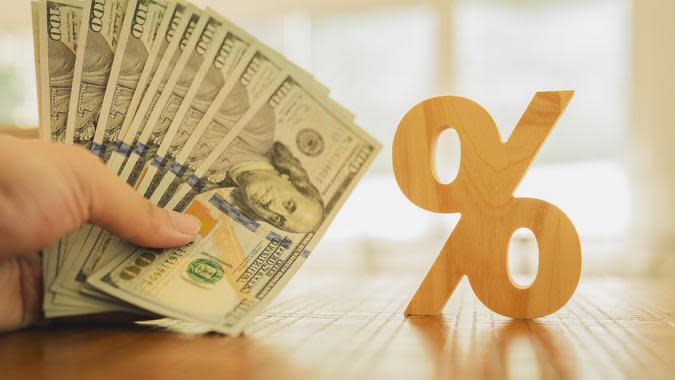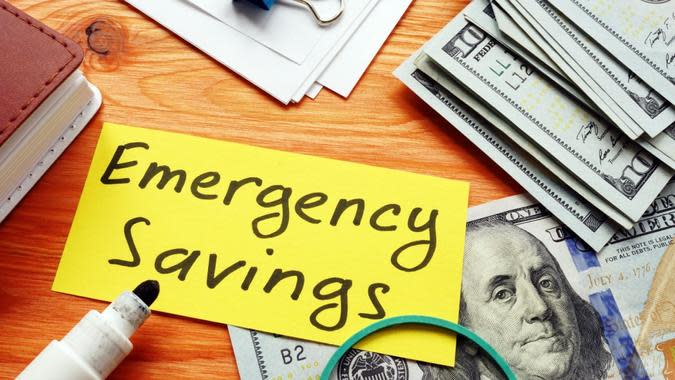25 Bad Habits You Must Avoid If You’re Trying To Save Money

A lot can influence how much you save, including your income level, debt load, cost of living and financial habits. If you’re trying to up your savings, one way to start is by taking a look at your money habits and changing the ones that are keeping you from that goal.
Here are 25 bad habits that should be avoided if you want to save money.
Be Aware: 5 Unnecessary Bills You Should Stop Paying in 2024
Check Out: How To Get $340 Per Year in Cash Back on Gas and Other Things You Already Buy

Skipping the Budget
Having a household budget can help you keep track of your income and expenses. This, in turn, can make it easier to reduce spending and increase your savings.
“Take the time to create an in-depth, realistic budget that details your income, expenses and savings goals, and track your spending to remain on track,” said Taylor Kovar, CFP, founder and CEO at 11 Financial.
Not sure how to get started with budgeting? Consider a free budgeting tool.
“Budgeting is easier than ever with an endless list of helpful money apps at your fingertips, and most can even be integrated with your bank to automate budget tracking,” said Erika Kullberg, attorney, personal finance expert, and founder of Erika.com.
Learn More: Mark Cuban Reveals Why He Keeps a Strict Budget Everyday
Try This: Nearly Half of Americans Struggle To Pay Their Utility Bills: 5 Ways To Save

Spending Impulsively
Impulsive spending can eat into your income faster than you think. Do it too often, and any extra money you could have otherwise saved vanishes.
“Spending money on things you don’t need means you’ll have less for what truly makes you happy,” said Eric Croak, CFP, accredited wealth management advisor and the president of Croak Capital. “It also means you’ll likely make slower progress toward your financial goals.”
To avoid this, make a shopping list whenever you go out, and follow it as closely as possible. Don’t put any last-minute items into your grocery cart — digital or real — unless it’s truly something you need.
Once you’ve cut back on this habit and started saving more regularly, you can always increase your spending later, as your income allows.
Find Out: 6 Valuable Everyday Items You Should Never Throw Away

Using Credit Cards
There are two main issues with credit cards: interest and ease of use.
Credit cards can promote impulsive spending, said Kovar. When you’ve got the means right at your fingertips, it’s all too easy to swipe or scan the card and make the purchase without thinking about your bank account balance or budget.
Plus, most credit cards come with incredibly high interest rates — up to 36%. If you carry a balance at the end of the month, you’ll get charged interest on the amount owed. Depending on how much you owe, this could be a hefty amount of cash.
Some people end up owing money for years beyond their initial purchase — thanks in large part to the interest. To avoid this, leave your credit cards at home. Or, if you still want to take advantage of the card’s rewards programs or other perks, pay off the full balance each month.

Paying Only the Minimums
When it comes time to paying the credit card bill, many people pay only the minimum amount due. This might seem cost effective at first, but it can lead to long-term debt and more interest charges over time.
Use your card responsibly, and pay more than the minimum amount due.

Taking on Loans
Any kind of debt, including loans, can chip away at your income and prevent you from saving money. This is due to interest charges and the fact that you have a recurring monthly bill that can last for months or even years.
Some loans might feel necessary. You might need an auto loan or a mortgage to get a car or a house, for example. But while one or two low-interest loans might be manageable, an overreliance on them can be problematic.
“Payday loans and other high-interest debt can make it more difficult for you to save money,” said Kovar. He recommended paying off your debts as quickly as possible to free up cash. And if you have multiple debts, you can always try for debt consolidation, if your credit is high enough.

Keeping Multiple Monthly Subscriptions
According to C&R Research, in 2022, the average person thought they spent about $86 a month on monthly subscription services — like video streaming, gym memberships and food delivery. In reality, they spent closer to $219.
That’s quite a bit of money for things you might not even use all that frequently. Look at your monthly subscriptions and cut out the less necessary ones. Put the extra cash toward savings.
Read Next: I’m a Frugal Shopper: 4 Items I Always Buy Secondhand To Save Money

Paying for Expensive Services
Certain monthly services, like the internet, might be necessary. That doesn’t mean you have to pay as much as you are, though.
“Remember, you are not married to your phone, cable or internet provider. At least once a year, you should look at what you are paying and be prepared to make a money-saving switch,” said Trae Bodge, smart shopping expert at TrueTrae.
Compare providers, switch to cheaper alternatives, and put the extra toward savings.

Not Comparison Shopping
Comparison shopping can take some time, but it’s worth it when you do it consistently and start seeing those savings coming in. Look into free price comparison apps or set up alerts so that you’ll know whenever things you want go on sale. This can save you money for other things.

Skipping the Savings Account
Have you been keeping your savings in a checking account? If so, it’s time to create a separate, dedicated account.
“Most savers will get a better rate on their money by moving it to an easy access or fixed-rate savings account,” said Croak. “That’s because most checking accounts offer little to no interest on your money, and there’s a risk you’ll spend this money if it remains in your account.”

Living Beyond Your Means
Living beyond your means essentially means you’re spending more than you should. You can see this in your monthly credit card statements and your end-of-the-month bank statements.
“The secret to building wealth is living below your means,” said Melissa Murphy Pavone, CFP and director of investments with The Breiter Group of Oppenheimer & Co. Inc. “You need to be clear on the income coming in and the expenses going out.”
By spending less, you’ll be better prepared for the unexpected — like emergency bills or major life changes. You’ll also have more money to save.
Discover More: 10 Things Frugal People Always Buy at Yard Sales To Save Money

Having Only One Income Source
If you’re living month to month, or if you’re unable to save as much as you’d like, it could be because you’re relying on only one income source. Pick up another, like a side hustle on the weekends, that can supplement your primary income.

Buying Luxury Items
It might feel nice to purchase high-end or luxury items, but it won’t help your savings situation.
“Before you buy something, make sure you really need it. You can do this by stopping and thinking about an item and then going back if you really want or need it. If you won’t go back to the store for it, it’s probably not a need,” said Scott Lieberman, founder of Touchdown Money.

Buying Only Brand-Name Goods
Generic or store-brand items are often just as good as those from national brands. They’re also generally cheaper.
Stop buying the expensive option and switch to the cheaper one. If you really dislike the generic version, you can always switch back later.

Not Setting Goals
Having financial goals is vital if you want to save money. They’ll keep you on track, for one thing.
“If you’re used to saving without any clear goals, it’s time for a change,” said Croak. “It’s essential to understand why you’re saving, because without a reason, it can be hard to start.”
Trending Now: 6 Reasons the Poor Stay Poor and Middle Class Doesn’t Become Wealthy

Assuming Your Spending Habits Are Fine
It’s important to check in every once in a while to make sure your spending habits align with your budget and goals. If you’ve been living month to month without doing this, you could be hurting yourself financially.
“I know it doesn’t sound too hot, but reviewing your expenses and weeding out the non-essential purchases is such a game changer,” said Kullberg. Do this once every four to six weeks.

Being Afraid To Invest
Getting started with investing can feel overwhelming or scary, but it doesn’t have to be. And if you do it right, you can watch your money grow — and get you one step closer to financial freedom.
You can always start with low-risk investments like government bonds. You could even put your money into a certificate of deposit (CD) with a higher yield than most savings accounts. You won’t have easy access to the money, but it’ll grow faster than if you were to keep it in checking.

Not Prioritizing Saving
Simply having extra money each month doesn’t mean you’re saving it. You’ll need to prioritize saving.
“If you wait until the end of the month to see what’s left from your income for saving, you might find there’s not much left,” said Croak. “This approach is especially risky when budgets are tight.
“It’s generally better to set up a direct debit to transfer money from your checking account to your savings account the day after you get paid. This creates an automatic savings habit, and you won’t forget to save or end up with nothing to put away.”

Paying Unnecessary Fees
A lot of bank accounts come with “junk fees,” which are essentially added costs that eat into your money. Review your accounts and make sure you’re not paying for things that don’t make sense.
“Things like cash advances, non-network ATMs and overdraft fees can damage your efforts to save money,” said Lieberman. “A little bit here and there can catch up to you and leave you in a trap that pulls you away from your goals.”
Explore More: How Much Does the Average Middle-Class Person Have in Savings?

Allowing Lifestyle Creep
Lifestyle creep is what happens when you start spending more money because you start earning more money. Over time, you start feeling like the things that were once optional are now essential.
“As your discretionary income increases, lifestyle inflation creeps in,” said Murphy. “Avoid the urge to spend more as you make more. Instead save more. Invest the difference.”

Skipping the Emergency Fund
An emergency fund is designed to protect you from unforeseen expenses, like a layoff at work or broken down car. Generally speaking, you’ll want to have at least three to six months’ worth of living expenses set aside for emergencies.
If you don’t have an emergency fund, you could be in for some trouble if something unexpected does happen. You could even end up taking on more debt just to make ends meet.
Build an emergency fund first, then focus on other savings goals.

Thinking Only in the Moment
If you want to successfully save money, you’ll need to think about the future. Consider what your future self needs rather than just what you want right now.
Having a clear roadmap for your financial future can help you stay motivated and focused. Without one, you might not be able to save or reach your long-term goals.

Going Out Instead of Staying In
You should be able to enjoy your life, but that doesn’t mean you have to spend everything you earn. If you frequently go out to the movies or dine out, see if you can cut back. There are free or less expensive options that can free up some cash for your savings.
Check Out: I’m a Self-Made Millionaire: Here’s My Monthly Budget

Only Buying New
“If you need something but can’t figure out how you’re going to afford it, consider buying used,” said Bodge. “For example, if you need an outfit for a special occasion, visit a local thrift store or an online thrift platform, like Poshmark or the Real Real. You can often find like-new items at a fraction of what they would be new.”

Giving Away Too Much Money
Being charitably inclined isn’t a bad thing, unless you’re giving away too much, and it’s keeping you from your savings goals. If this sounds like you, you might need to limit how much you donate and prioritize your own financial well-being first.
This doesn’t mean you have to stop being charitable, though. Set up a separate small fund each month that you can use for donations. If you account for it in your regular budget, it won’t eat into your savings.

Ignoring the Deals
Whenever you shop, you should be looking for discounts, sales, and other deals that’ll save you money. If you’re not doing this, you’re just spending what you didn’t need to.
“We all know that things go on sale, but we are leaving money on the table if we don’t time our purchases around those sales — especially pricey items,” said Bodge. “For example, if you need a new home appliance, May happens to be Maytag Month… where you can save up to 30% off major appliances. That is nothing to sneeze at when you’re spending hundreds, if not thousands of dollars on a new appliance!”
There are plenty of other major sales throughout the year, too. This includes Memorial Day, Amazon Prime Days, Black Friday and so on.
More From GOBankingRates
This article originally appeared on GOBankingRates.com: 25 Bad Habits You Must Avoid If You’re Trying To Save Money

 Yahoo Finance
Yahoo Finance 